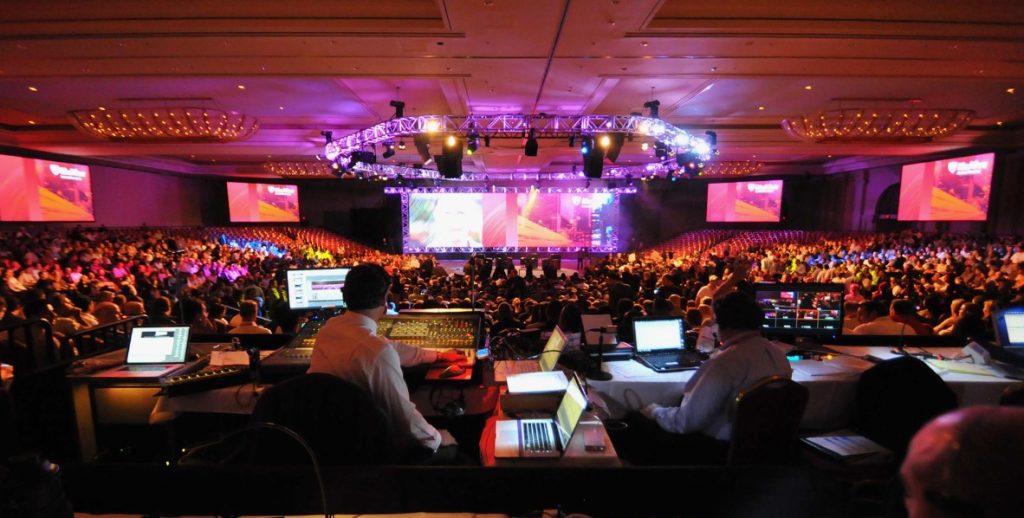The rapid advancement of artificial intelligence (AI) and automation is transforming the event management industry. These technologies are streamlining processes, enhancing attendee experiences, and providing deeper insights through data analysis. This article explores the impact of AI and automation on event management, backed by research and practical applications. AI and automation are revolutionizing event management, making it more efficient, personalized, and data-driven. These technologies are not just improving operational aspects but also redefining the attendee experience, making events more engaging and impactful.
AI refers to the simulation of human intelligence processes by machines, especially computer systems, while automation involves using technology to perform tasks with minimal human intervention. Together, these technologies optimize processes and enhance experiences in event management services.
Revolutionizing Event Operations
Intelligent Scheduling and Resource Allocation
AI algorithms can optimize scheduling and resource allocation by analyzing numerous variables such as attendee preferences, speaker availability, and room capacities. This ensures that events run smoothly and resources are used efficiently. AI-powered platforms like Bizzabo and Eventbase can automate the scheduling of sessions and allocation of spaces, ensuring optimal use of resources and reducing conflicts.
Research by Event Tech Lab indicates that AI-driven scheduling can improve operational efficiency by 40%, significantly reducing the workload for event planners.
Streamlined Communication and Coordination
Automation tools can streamline communication and coordination among event staff, vendors, and attendees. Automated reminders, updates, and notifications ensure everyone is informed and aligned. Platforms like Slack and Microsoft Teams can integrate with event management software to automate communication, sending reminders about sessions, deadlines, and tasks.
A study by TechNavio predicts that the use of automation in communication can enhance event coordination efficiency by 30%, reducing the chances of miscommunication and delays.

Enhanced Marketing and Promotion
AI can significantly improve event marketing efforts by analyzing audience data to create targeted campaigns, predict trends, and measure the effectiveness of marketing strategies. AI tools like HubSpot and Marketo can analyze attendee data to create personalized marketing campaigns, track engagement, and optimize promotional strategies.
Research from Forrester indicates that AI-powered marketing can increase event attendance by 20%, demonstrating the technology’s ability to attract and engage potential attendees.
Elevating Attendee Experiences
Personalized Content and Recommendations
AI can personalize the attendee experience by analyzing preferences and behavior to provide tailored content, session recommendations, and networking opportunities. Event apps like Grip and Brella use AI to recommend sessions, exhibitors, and networking opportunities based on individual attendee profiles and past behavior.
A study by Accenture found that personalized experiences can increase attendee satisfaction by 33%, highlighting the importance of AI in creating customized event experiences.
Interactive Virtual Assistants
AI-powered virtual assistants and chatbots can provide real-time support to attendees, answering queries, guiding them through the event, and providing personalized assistance. Chatbots like ChatGPT and Watson Assistant can handle a wide range of attendee queries, from event schedules to venue directions, ensuring attendees receive timely and accurate information.
Research by Gartner predicts that by 2025, 80% of customer interactions will be managed by AI, reflecting the growing adoption of AI-powered virtual assistants in enhancing attendee engagement.
Real-Time Engagement Analytics
AI and automation enable the collection and analysis of real-time engagement data, providing insights into attendee behavior and preferences. This data can be used to adjust the event experience dynamically. Platforms like CrowdCompass and PheedLoop can analyze real-time engagement data, such as session attendance and interaction levels, to make on-the-fly adjustments and improve the attendee experience.
A report by PwC indicates that real-time analytics can enhance event engagement by 25%, providing valuable insights for improving the attendee experience.
Enhancing Post-Event Analysis
Comprehensive Feedback Analysis
AI can automate the collection and analysis of attendee feedback, providing detailed insights into what worked well and what needs improvement. This helps in refining future events. Tools like SurveyMonkey and Qualtrics can use AI to analyze open-ended feedback, identify common themes, and provide actionable insights.
Research by Harvard Business Review shows that AI-driven feedback analysis can increase the accuracy of insights by 40%, leading to more effective post-event evaluations.
Predictive Insights for Future Events
AI can leverage historical data to provide predictive insights, helping event planners anticipate trends, preferences, and potential challenges for future events. Predictive analytics platforms like Salesforce Einstein can analyze past event data to forecast future attendee behavior and preferences, enabling more informed decision-making.
According to a report by Deloitte, predictive analytics can improve event planning accuracy by 50%, making it a crucial tool for anticipating and meeting attendee needs.
Enhanced Reporting and Visualization
Automation can streamline the creation of detailed reports and visualizations, making it easier for event planners to understand and communicate the outcomes and impact of their events. Tools like Tableau and Power BI can automate the generation of comprehensive reports and visual dashboards, providing clear and actionable insights.
Research by McKinsey highlights that automated reporting can reduce the time spent on data analysis by 60%, allowing event planners to focus on strategic improvements.

Addressing Challenges and Considerations
Ensuring Data Security and Privacy
The use of AI and automation in event management involves handling sensitive attendee data, raising concerns about privacy and security. Implement robust data protection measures, adhere to regulations such as GDPR, and maintain transparency with attendees about data usage.
Overcoming Integration Challenges
Integrating AI and automation tools with existing event management systems can be complex and resource-intensive. Choose scalable AI and automation solutions that offer seamless integration capabilities and provide adequate training and support for staff.
Balancing Cost and Value
Implementing AI and automation technologies can be costly, and ensuring they deliver value is crucial. Conduct a thorough cost-benefit analysis, prioritize technologies that offer the highest ROI, and continuously monitor their impact on event outcomes.
Future Directions in AI and Automation for Event Management
Advanced AI for Enhanced Personalization
Future advancements in AI will enable even deeper levels of personalization, tailoring every aspect of the event experience to individual preferences and behaviors. AI could provide real-time personalized content, dynamically adjusting recommendations based on attendee interactions throughout the event. Research by IDC suggests that advanced AI could boost event engagement by 40%, further enhancing the attendee experience.
Integrating AI with Augmented Reality (AR)
The integration of AI with AR will offer new possibilities for immersive and interactive event experiences, combining real-world and virtual elements seamlessly. AI-driven AR applications could provide interactive, context-sensitive overlays during events, enhancing engagement and information delivery. A study by ABI Research predicts that AI-integrated AR could improve attendee engagement by 50%, creating more immersive and interactive event experiences.
Blockchain for Secure Event Management
Blockchain technology can enhance the security and transparency of event management processes, from ticketing to data sharing. Blockchain-based systems could ensure secure, tamper-proof ticketing and transactions, increasing trust and reliability in event operations. Research by Forrester highlights that blockchain can improve transaction security and transparency by 30%, making it a valuable addition to event management technologies.
Conclusion
AI and automation are transforming event management, offering unprecedented efficiency, personalization, and data-driven insights. As these technologies continue to evolve, their impact on the industry will only grow, setting new standards for event experiences. By embracing AI and automation, event organizers can create more engaging, efficient, and memorable events, ensuring their success in an increasingly competitive landscape.
Incorporating AI and automation into event management is not just a trend but a necessity for staying ahead in the modern era. These technologies provide the tools needed to meet the ever-growing expectations of attendees and deliver experiences that are engaging, educational, and enjoyable. The future of event management lies in the seamless integration of AI and automation, making every event an intelligent and unforgettable experience.

I like to give reasonable advice on budgeting to people with any income level. I currently live in Portland, Oregon, and am available for freelance assignments and speaking engagements.
